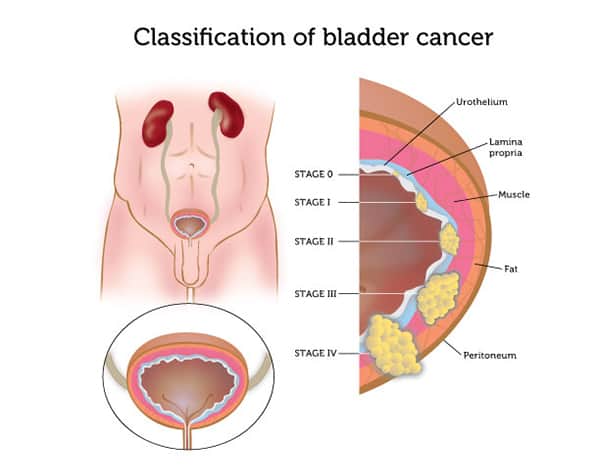Bladder cancer is not typically something that young people can expect to experience, but the fact remains that this disease can affect anyone at any age. It begins in the cells that make up the inner lining of the bladder and, if not detected early, can spread throughout the organ and even to other body parts.
At Comprehensive Urology, our doctors are specialists in bladder cancer treatment. We combine extensive training and experience with the most advanced therapies and techniques available, and we tailor every treatment to meet each patient’s unique needs.
In order to successfully fight the disease, you should be aware of the common early bladder cancer symptoms. Catching it in the early stages, especially while the cancer cells are still restricted to the bladder itself, increases your chances of having a successful outcome dramatically.
Bladder Cancer Symptoms
The symptoms of cancer of the bladder are often not specific and can be confused with other urologic disorders. However, the following are the most common signs of bladder cancer to watch out for.
Blood in Urine
Early cancer symptoms may not cause pain, but you might notice hematuria, or blood in your urine. It could turn your urine bright red, pink, dark red, or even orange. In other cases, the urine may look normal, yet after a subsequent urinalysis (such as during a routine medical checkup), the results could show microscopic amounts of blood.
While hematuria is not necessarily an accurate cancer diagnosis, it should not be ignored. Have it checked out by a urologist to see if the issue is one of the following:
- Infection
- Benign lesions
- Kidney or bladder stones
- Other benign kidney diseases
Although it could signify a less serious condition, you’ll want to be sure, especially since blood may appear one day and then not the next. In fact, your urine could stay clear for weeks.
Urination Changes
Changes in urination is a rather vague way to identify possible bladder cancer symptoms, so let’s break them down in more detail.
Frequent urination – more so than normal, even though you aren’t ingesting fluids more than normal
Pain during urination – persistent pain or burning when you urinate
Urgency to urinate – frequently feeling like you have to pee only to notice that your bladder is not full
Trouble getting started – not just in public but anytime, even in your home
Weak urine stream – not the usual intensity
Remember, the above changes are not only signs of cancer but also common signs of other, less serious urologic issues, such as stones, a urinary tract infection, a non-cancerous tumor, an overactive bladder, or, in men, an enlarged prostate.
Learn more about urinary tract infections at WebMD.com.
Back Pain
In serious cases where the disease has grown larger or spread elsewhere in the body, you might experience back pain, which is one of the many common symptoms of bladder cancer that can also be a sign of other common urinary issues.
Other, More Generalized Symptoms
You should keep in mind that cancer may cause symptoms that are less specific and can be attributed to other health conditions, such as:
- Pelvic pain
- Chronic fatigue
- Unexplained weakness
- Loss of appetite
- Unplanned weight loss
- Swelling in the feet
- Bone pain
Again, it’s important to understand that, individually, none of these bladder cancer symptoms are definitive.
However, if you start experiencing a combination of them, say three or four (or more), be safe and see a doctor – preferably a urologist for a closer analysis and clear-cut diagnosis.

Diagnostic Methods
If you suspect that you’re experiencing any one of the most common symptoms of cancer of the bladder, your doctor could determine your condition by using one of the following tests, which will look for foreign substances or cells in the urine.
Urinalysis – a urine test to detect blood and other material in urine
Urine cytology – a microscopic method of searching for cancer cells in the urine
Urinalyses for markers – cutting-edge tests that look for substances (tumor markers), such as certain antigens or chromosome changes, that could signify bladder cancer
For more information about these methods of making a cancer diagnosis, please contact Comprehensive Urology.
Common Cancer Risk Factors
If you notice the changes in bladder function or other symptoms of cancer, keep in mind the following risk factors:
- Smoking
- Age (rare in people younger than 40)
- Ethnicity (whites have a greater risk)
- Gender (men are more susceptible)
- Chemical exposure (manufacturing dyes, textiles, rubber, and paint products)
- Previous treatment for cancer
- Some diabetes medication
- Chronic inflammation of the bladder
- History of cancer in the family
Some risk factors can be avoided, such as smoking and exposure to chemicals, although others cannot, obviously.
Contact Comprehensive Urology for a Thorough Consultation
Bladder cancer can be treated effectively, especially when it’s caught in time. The treatment method varies and depends on a range of factors, so if you suspect that your symptoms could actually signify cancer, don’t hesitate to contact the Los Angeles urology and bladder cancer specialists at Comprehensive Urology today. Schedule a consultation by calling 310.307.3552 or contact us online.
In a nutshell: Bladder cancer
- Risk factors: Smoking, chemical exposures, age and ethnicity, family history, chemo or pelvic radiation therapy for other cancers
- Symptoms: Can vary but most importantly include no symptoms, blood in urine, weight loss, change in urinary frequency/urgency
- Staging: If diagnosed with bladder cancer, it is important to know if the cancer is confined to the bladder or involves other organs as this can significantly affect treatment.
Next, read The Top 5 Benefits of ThermiVa Treatment